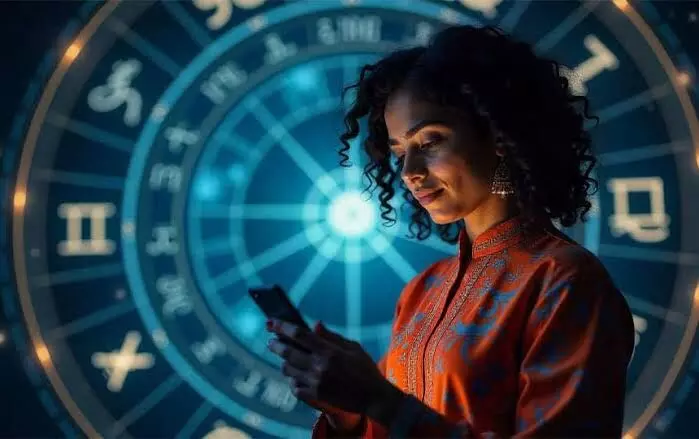Astrology finds new life on Instagram as millennials and Gen Z use it for identity, community
Through memes, infographics and short videos, young audiences are giving astrology a modern, digital identity
By Anoushka Caroline Williams
Astrology finds new life on Instagram as millennials and Gen Z use it for identity, community
Hyderabad: Astrology has long been part of human culture, appearing in ancient texts, community almanacs and the back pages of newspapers. In India, the panchang (Hindu calendar) and family astrologers were once the main sources for predictions.
Globally, horoscope columns were read with curiosity, if not devotion. Today, this centuries-old practice has found a surprising revival on Instagram.
What meaning does astrology provide now?
For Millennials and Gen Z, astrology is no longer just about predicting the future. Instead, it is being recast as a form of self-discovery, community building and entertainment.
Through memes, infographics and short videos, young audiences are giving astrology a modern, digital identity.
“Instagram has changed the way people interact with astrology,” explained Dr Meera Subramaniam, cultural sociologist, speaking to NewsMeter. “It is no longer just something you passively consume. It’s visual, interactive and shareable, which makes it appealing to younger generations.”
Relating signs to the internet generation
Astrology’s migration from print to social media marks a significant cultural shift.
In the 1990s and 2000s, horoscopes were tucked into lifestyle pages of newspapers and magazines. With the rise of the internet, websites began offering free daily predictions. Today, Instagram has emerged as the dominant space for astrological content.
Astrology accounts range from professional astrologers giving personalised readings to meme pages posting zodiac-related jokes. Some creators combine astrology with wellness, spirituality or even career coaching. Others focus on quick, snackable content like ‘What Each Zodiac Sign Should Try This Weekend’ or ‘Signs Ranked by How Likely They Are to Ghost You.’
Why young people are drawn to it
The popularity of Instagram astrology is linked to broader social and economic realities.
Many millennials and Gen Zers face unstable job markets, rising living costs and shifting relationship dynamics. Astrology, with its accessible and non-judgmental tone, provides comfort.
Ritika Sharma, an astrologer with 2,50,000 Instagram followers, observed: “Young clients rarely ask about wealth or marriage in the traditional sense. They want to know how to deal with workplace stress, whether they’re compatible with someone they’re dating or how to set boundaries. Astrology becomes a framework for self-reflection.”
Unlike earlier generations, who may have approached astrology with reverence or scepticism, today’s youth treat it as a flexible tool. One can ‘believe a little’ or simply use it for fun without committing to it fully.
The role of memes and aesthetics
One of the key drivers of astrology’s resurgence on Instagram is its visual nature.
Zodiac signs are now represented through pastel-coloured infographics, reels and meme formats that spread quickly across feeds.
“Memes allow astrology to function as both identity and humour,” said Dr Anirudh Rao, psychologist specialising in youth culture. “A person might not deeply believe in star signs but still share a meme about their ‘Leo confidence’ because it feels relatable or funny. That’s how astrology enters everyday conversation.”
Astrology aesthetics, moon phases, constellation graphics and starry motifs have also seeped into fashion, tattoos, and even brand marketing.
Commercialisation and branding
Businesses are noticing the trend. Several beauty, fashion, and lifestyle brands now collaborate with Instagram astrologers for campaigns. For instance, ‘zodiac-based product drops’ and limited edition items tied to astrological events (like Mercury retrograde) are increasingly common.
This blend of spirituality and commerce raises questions about authenticity. Some traditional practitioners criticise the trend for oversimplifying astrology into clickbait. Others see it as an inevitable adaptation.
“Every generation reinvents astrology in its own way,” says Dr Subramaniam. “In the 1970s, it was about counterculture movements. Today, it’s Instagram reels and brand collabs.”
Scepticism and concerns
While the revival of astrology has its appeal, experts caution against over-reliance. Mental health professionals, in particular, warn that people should not substitute therapy or evidence-based decision-making with online readings.
Dr Rao said, “Astrology on Instagram can be empowering in small doses. But when individuals begin making major life decisions, career changes, breakups, and financial risks based solely on general predictions, it becomes problematic.”
There are also concerns about misinformation. Not all Instagram astrologers have formal training, and some blend astrology with unverified “healing” practices. The line between entertainment and advice can easily blur.
What is the future of digital astrology?
Looking ahead, astrology’s role on Instagram is likely to expand further. With interactive features like polls, live sessions, and AI-driven chart readings, the platform is well-suited for personalised engagement. Astrology apps are also integrating Instagram-style design to attract younger users.
As Sharma summed it up: “Astrology has always adapted to technology. From temple priests to newspaper columns to Instagram reels, its core appeal is the same: people want to make sense of their lives. The medium just keeps changing.”
Astrology’s resurgence on Instagram is not about blind belief but about expression, identity and community. For Millennials and Gen Z, horoscopes are less about destiny and more about dialogue, whether that dialogue happens in memes, reels, or direct messages to an astrologer.
While scepticism remains valid, one thing is clear: astrology is no longer confined to tradition. It is being rebranded for the digital age, and Instagram is at the centre of this transformation.